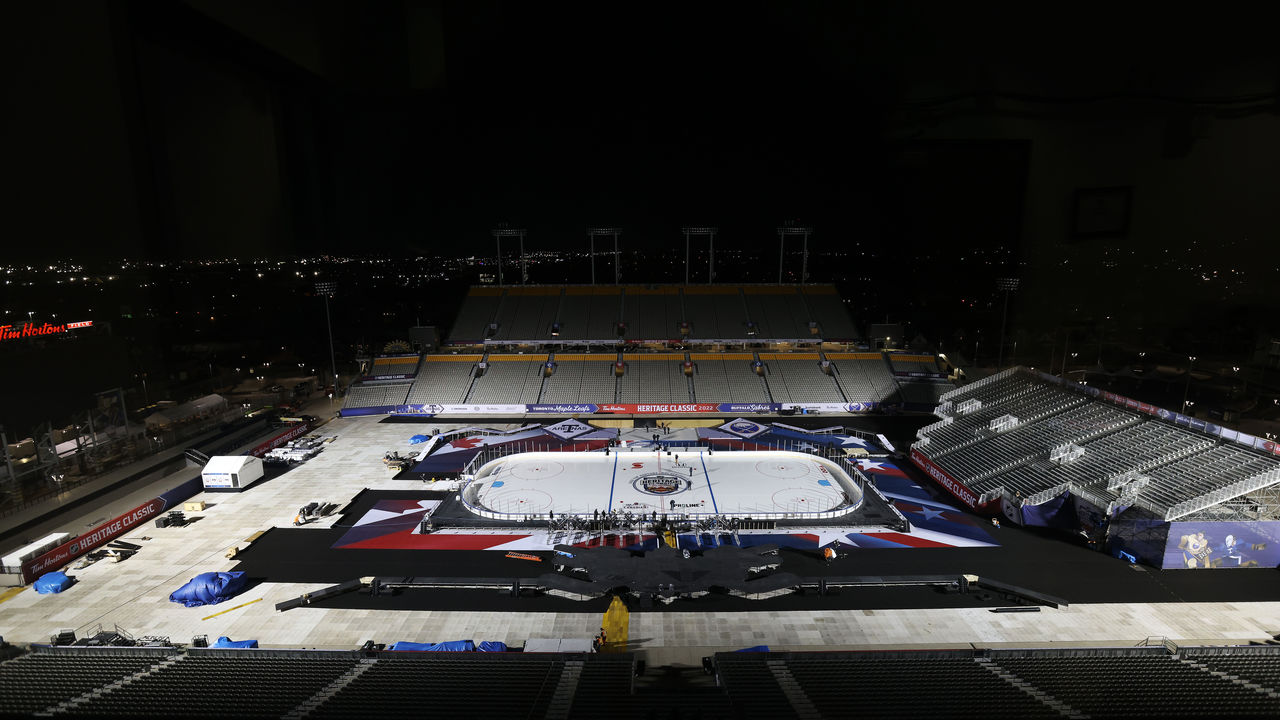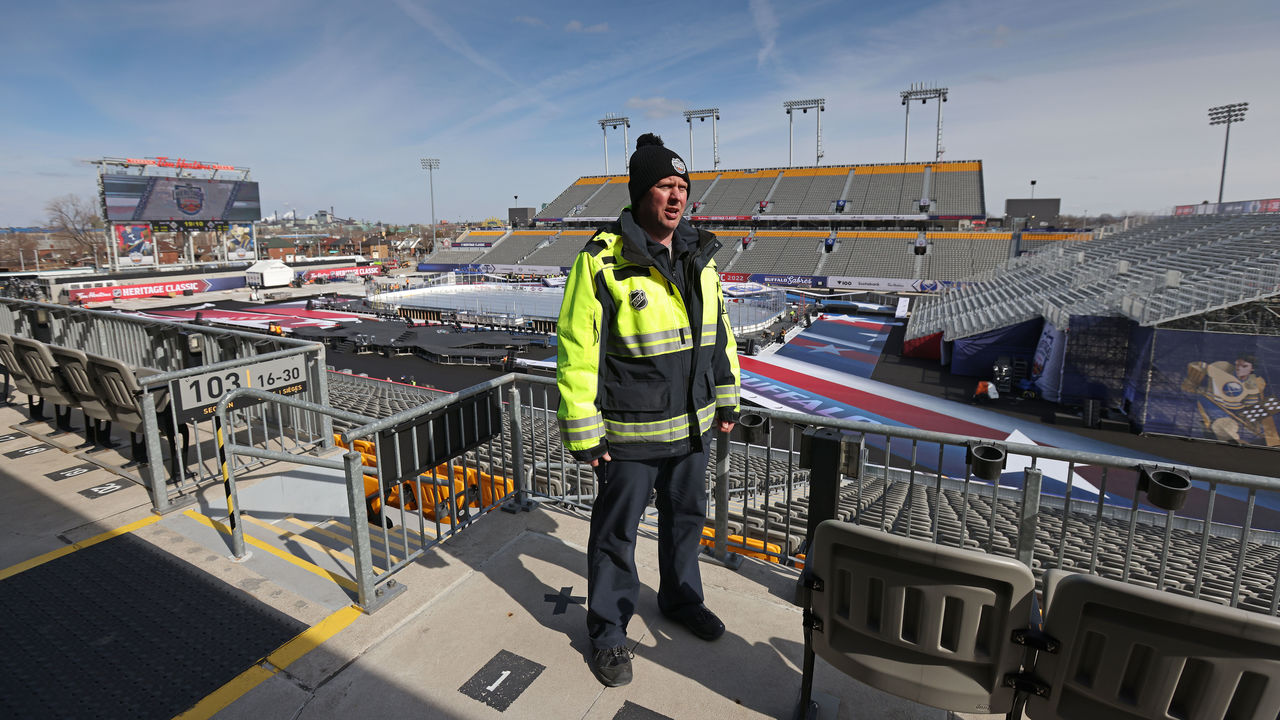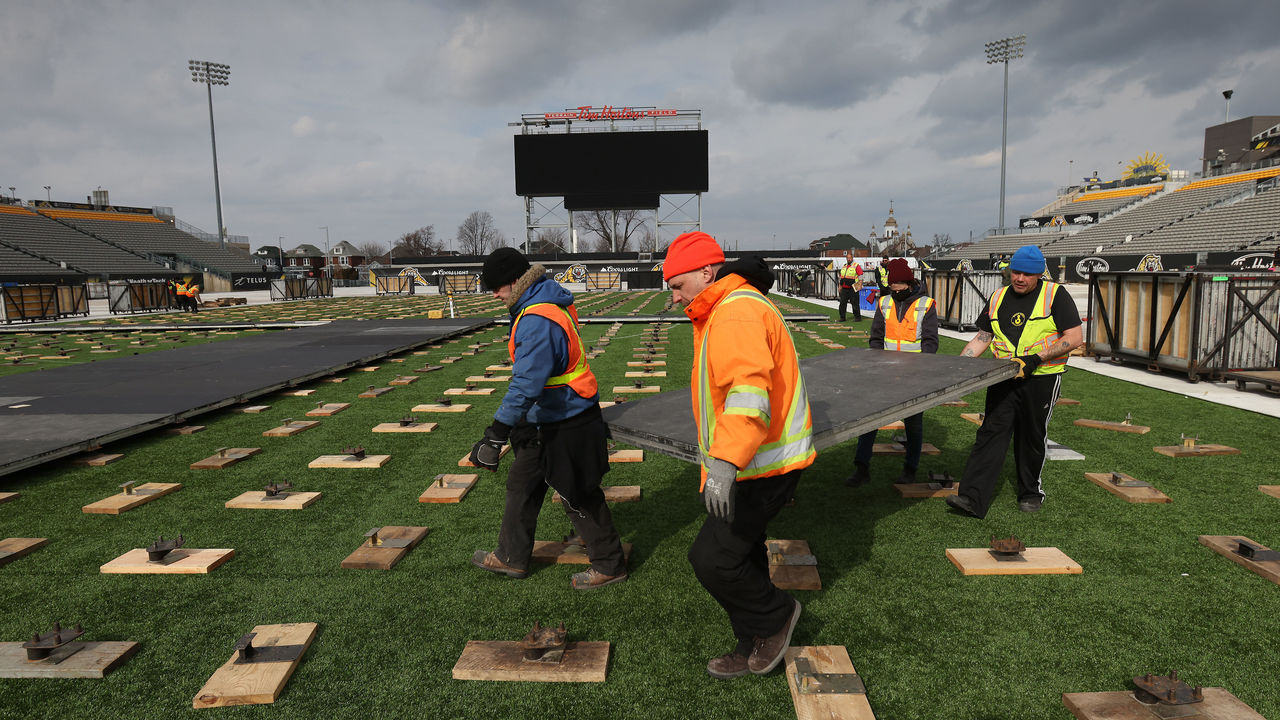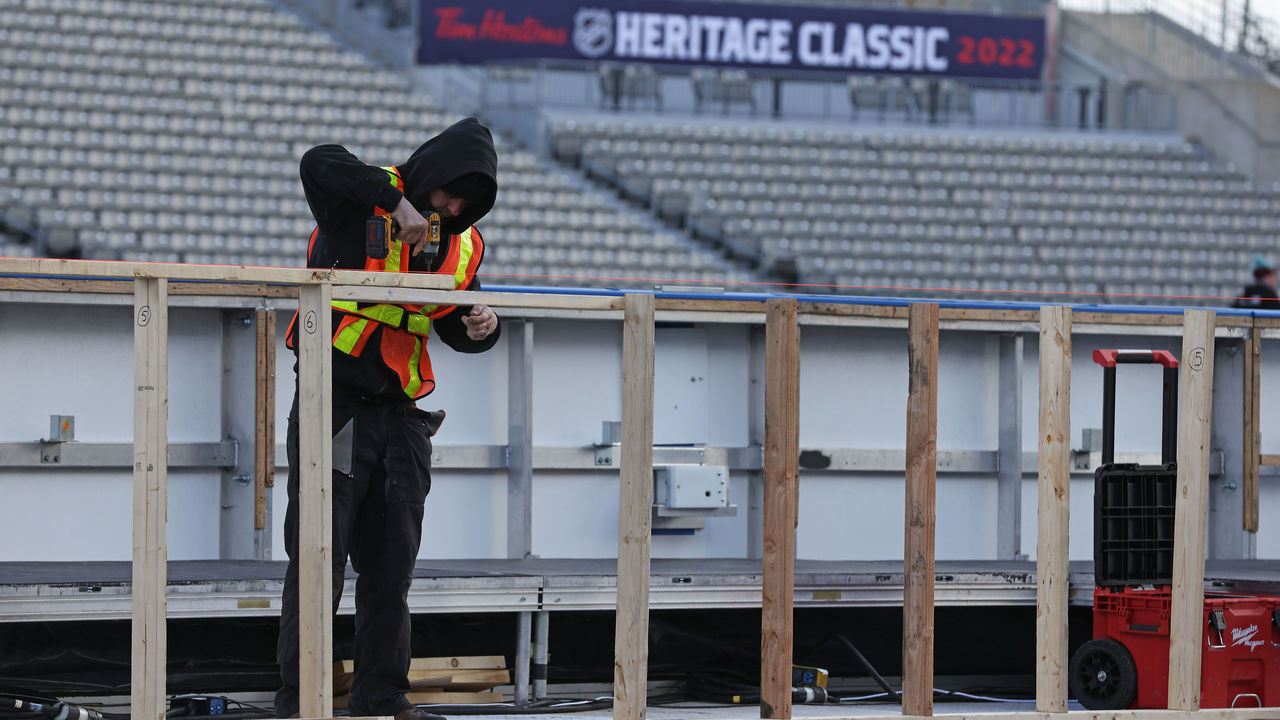'No such thing as a perfect event': NHL crew ready for another outdoor challenge
HAMILTON, Ont. - The sky is dark gray. The temperature is hovering above freezing. Snow is falling in flakes the size of a nickel. An ice surfacer is doing laps while crew members shovel mounds of snow off the NHL-sized sheet.
It's shortly after 5 p.m. on Friday, and this is the scene at field level at Tim Hortons Field, the venue for Sunday's outdoor game between the Toronto Maple Leafs and Buffalo Sabres. Snow removal is likely to continue past midnight.
"We've got snow until, I think, 1 a.m. The guys will just keep doing this," Derek King, one of the league's head ice makers, says as he surveys the commotion around him. "We started at 10 o'clock this morning and haven't stopped."

Technically a Sabres home game, the 2022 Heritage Classic is being staged 63 miles north of Buffalo's KeyBank Center and 43 miles south of Toronto's Scotiabank Arena. The pro football stadium, situated in a residential area in the east end of Hamilton, will welcome roughly 25,000 people through its gates on Sunday. Smokestacks from nearby steel factories fill the skyline, and the original Tim Hortons restaurant - whose co-founder and namesake played for the Leafs and Sabres during a Hall of Fame career - is a short walk away.
Two Mondays ago, a 53-foot, 300-ton capacity mobile refrigeration unit and rink system was parked outside the stadium to signal the start of the build-out process. By week's end, boards were standing and ice-making had officially begun. On Wednesday, lines and logos were painted, and on Thursday, the glass was installed while the ice got topped up with its last quarter of an inch.
This is the NHL's third and final outdoor game of the season and 35th since 2003. Each passing event serves as an education for future events. And up until recently, only one man had been at the controls. Known for 24 years as the league's leading "ice man," Dan Craig retired - or "graduated," as he put it - this past November. His legacy on the sport will be on full display Sunday.
"These events, and the success of these events, and the quality of the ice in our 32 rinks, have Dan's prints all over them. And they will as long as we're doing them," says Kris King, senior VP of hockey operations for the NHL.

Mike Craig (Dan's son) and Derek King (no relation to Kris) have taken over as head ice men. Engineers by trade, both are longtime league employees who go by the title of senior manager of facilities ops and hockey ops. Mike Craig, who's based out of Kelowna, B.C., has worked in chilly hockey arenas his entire adult life, while Derek King, of Winnipeg, entered the workforce as a paramedic before switching to ice making in the early 2000s.
"Dan was always a hands-on guy, and we tried hard to get him to spread the wealth," Kris King says. "'Dan, you don't have to be here for 24 hours a day. Trust the guys. You've taught them well.' Near the end, he finally figured it out."
While their mentor is a phone call away, the Heritage Classic is Mike Craig and Derek King's show, and the objective is to produce the finest ice possible for the players. They lead a veteran crew of workers that's encountered basically everything imaginable over the years, from freezing rain, high winds, and dense fog to warm temperatures, high humidity, and bright sunshine.
According to The Weather Network forecast, the temperature at 4 p.m. puck drop should be 30 F, with a cloudy sky, 16 miles-per-hour wind, and a 40% chance of snow. Relatively speaking, those are decent conditions for an outdoor game.
"There's no such thing as a perfect event," Mike Craig says, reciting a common joke among the group. Mother Nature always finds a way to alter best-laid plans, which isn't particularly enjoyable in the moment, but it results in a sense of great satisfaction when the event's nearing the finish line. "They all have their challenges," he adds, "and they all have their pretty cool moments."

Aside from one rainy day, the weather gods have largely cooperated with the league's itinerary for Hamilton. Rain can be a killer, especially in warmer climates. Just a couple of weeks ago, ahead of the Stadium Series game in Tennessee, stress levels rose when a lengthy storm ran through Nashville.
"We had 73-degree weather with 16 hours of straight rain," Kris King says. "We couldn't freeze the water fast enough." The rink lost an inch and a quarter of ice, and it's supposed to be two inches thick on game day. However, since the crew had anticipated the ugly stretch of weather and started the build-out a few days earlier than normal, the ice was salvageable.
The league had learned its lesson from the 2020 Winter Classic in Dallas, where crap really hit the fan thanks to a cocktail of relentless rainfall, warm temperatures, and high humidity. It got so bad they had to temporarily remove a section of the end boards so workers could squeegee water more efficiently.
"We lost everything in Dallas. We lost the lines and logos. We lost the white paint ... everything," Derek King says. Once the storm passed and the refrigeration unit started stabilizing the rink temperature again, the build was back on track. "We had three days to get the sheet back, thankfully," he adds.
The head ice men have multiple weather apps on their smartphones, as well as a special ice monitoring app called Eye On The Ice. This 24/7 surveillance of the venue is crucial no matter the air temperature. For instance, during the build-out for the 2011 Heritage Classic, the temperature in Calgary hit minus-31 F, yet "our ice is melting because it was so sunny out," Kris King laments.

At ice level Friday evening, Derek King, dressed for the elements with a thick winter jacket and a baseball cap emblazoned with the NHL crest, brings up the 2018 Stadium Series game between the Leafs and Washington Capitals at Navy-Marine Corps Memorial Stadium. That windy experience in Annapolis, Maryland, will inform how he and Mike Craig handle this weekend in Hamilton.
"We had to remove all of the glass the day before game day," Derek King recalls of the 2018 adventure. "The whole site got shut down because of how strong the winds were. We're looking at something similar for tomorrow."
If the wind is having a material impact on the game, Kris King says, the Leafs and Sabres will switch sides halfway through the third period. Both teams will spend 10 minutes each with the wind at their backs and in their faces.
On top of the outdoor events, the head ice men are responsible for ice standards across the league, as well as rinks used for special programming like showcase games in Europe and the Hockeyville exhibition series. They're on the road for long stretches, with Derek King, for example, leaving Winnipeg on Feb. 12 to head the Nashville event and returning home on March 20.
"It's a work family, for sure," he says. On cue, Kris King enters his field of view and starts poking the bottom of the sideboards with an ice-chipping tool. "We even have the boss working," Derek King says, letting out a hearty laugh.
Mike Craig, son of the original ice man, knows it's important to soak up the uniqueness of the gig. "At some point, even just during the game or on the practice day, whatever it is, just to take a few minutes to realize how special it is and how cool of an opportunity it is to do these kinds of events," he says.
John Matisz is theScore's senior NHL writer. Follow John on Twitter (@MatiszJohn) or contact him via email ([email protected]).
HEADLINES
- Stamkos moves into 20th on NHL goals list with winner in Preds' comeback
- Zucker breaks 3rd-period tie to give surging Sabres win over Panthers
- Capitals top Islanders to pull within 2 points of 3rd in Metropolitan Division
- Trotz to step down as Predators GM
- Ducks beat slumping Golden Knights to sweep season series